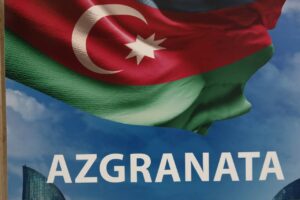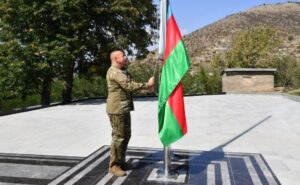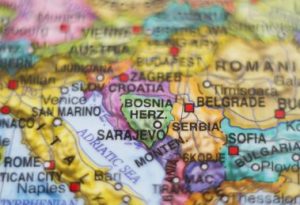
On Tuesday, official events were held at the Intercontinental Hotel in Kyiv to mark the 107th anniversary of the proclamation of independence of the Republic of Azerbaijan. Among the guests were representatives of the Verkhovna Rada, the government, the diplomatic corps, and expert and business circles of Ukraine.
Greeting those present, Ambassador Extraordinary and Plenipotentiary of the Republic of Azerbaijan to Ukraine Seymur Mardaliev called May 28 “a day that marks the birth of an independent nation rich in history, culture, and resilience.” In his speech, he drew a historical parallel between the Azerbaijan Democratic Republic of 1918 and the modern state:
“Exactly 107 years ago, on May 28, 1918, with the adoption of the Declaration of Independence, the Azerbaijan Democratic Republic was founded — the first parliamentary democracy in the entire Muslim East. The ADR was created on the principles of freedom, equality, and national self-determination. It was not only a bold manifestation of our people’s right to statehood, but also an innovative example of democratic governance in the East,” he said.

The ambassador emphasized that although the ADR existed for only 23 months, it left a deep mark on the history of Azerbaijan.
“This experience of independent statehood became an important part of national identity when Azerbaijan regained its independence in 1991 and proudly proclaimed itself the successor to the ADR. The Azerbaijani tricolor, national anthem, and coat of arms reflect the legacy of this historic republic,” Seymour Mardaliev emphasized.
He highlighted the successes in the field of clean energy, mentioning the launch of the Southern Gas Corridor, the development of the Black Sea submarine cable project, and the national “green growth” strategy, which aims to reduce greenhouse gas emissions by 40% by 2050.
“Today, under the wise and far-sighted leadership of President Ilham Aliyev, Azerbaijan is a sovereign, democratic country that is successfully implementing the ideals of the ADR through effective governance, dynamic human capital development, and active foreign policy. We are experiencing the most successful period in our history,” the ambassador emphasized.
Speaking about the partnership with Ukraine, Mardaliev emphasized the strategic nature of bilateral relations. He also mentioned the recent political consultations between the two countries, including the visit of Ukrainian Foreign Minister Andriy Sybiga to Azerbaijan.
“Azerbaijan and Ukraine have traditionally strong ties based on mutual respect, trust, and support for each other’s territorial integrity. Since the beginning of the war in Ukraine, Azerbaijan has been actively providing humanitarian aid, which has already reached a total of US$42 million. And we are ready to continue our support. Azerbaijan supplies energy equipment, finances the reconstruction of social infrastructure facilities in Irpin, and provides fuel for emergency services through SOCAR Ukraine. In February this year, President Aliyev signed a decree on additional aid to Ukraine in the amount of US$1 million. We also support humanitarian demining, in particular by supplying equipment and training specialists,” he said.
In his speech, Mardaliev also touched upon Azerbaijan’s achievements in the environmental sphere and at the global level:
“Azerbaijan has voluntarily committed to reducing greenhouse gas emissions by 40% by 2050, and Karabakh and Eastern Zangezur are being transformed into green energy zones. We are actively working on transregional energy projects, in particular the Black Sea submarine cable project, which will allow us to export ‘green’ energy to Europe,” he said.

Special attention was paid to the issues of recovery and peace in the South Caucasus. The speech included messages about Baku’s desire for lasting peace in the region. In particular, Mardaliev noted the achievements in direct negotiations with Armenia, emphasizing the need to conclude a peace agreement.
“We have begun unprecedented restoration work in the liberated territories and at the same time strive to achieve a just and lasting peace with Armenia. Azerbaijan clearly states: it is time to turn de facto peace into de jure peace. We want to live in peace as two sovereign states within internationally recognized borders,” the ambassador emphasized.
At the end of his speech, Mardaliev called for unity and thanked the Ukrainian side for its partnership.
“Dear friends, I am sincerely grateful to each of you for being with us today, for supporting Azerbaijani-Ukrainian ties and deepening the friendship between our countries. Together we are stronger. Glory to Azerbaijan! Glory to Ukraine! Glory to Azerbaijani-Ukrainian friendship!” he concluded.
On May 28, 1918, the independence of the Azerbaijan Democratic Republic (ADR) was proclaimed in Tbilisi — the first secular republic in the Muslim East. The ADR existed until April 1920, when Bolshevik troops established control over its territory. In 1991, after the collapse of the USSR, Azerbaijan regained its independence. May 28 is celebrated annually as the main national holiday — Independence Day.
AZERBAIJAN, CAUCASUS, INTERNATIONAL_RELATIONS, SEYMOUR_MARDALIEV, UKRAINE

After Azerbaijan established control over the former Nagorno-Karabakh, the Transcaucasus region entered a new era, where the political and economic prospects of the countries of the region became a subject of discussion in the international arena. In light of this, experts from various countries are analyzing the current situation and trying to predict the future of relations between the countries in the region. A new video published on the YouTube channel “Experts club” was devoted to this very topic, in which Azerbaijani military analyst, leading expert of the analytical center “STEM” Agil Rustamzadeh and the founder of the Kiev analytical center “Experts club”, candidate of economic sciences Maxim Urakin shared their opinion on the situation.
Military-political aspect
The experts emphasize the importance of the reached mutual understanding on the Karabakh issue.
“The resolution of the conflict has created a basis for the resumption of diplomatic dialog and economic cooperation between the countries of the Transcaucasus. Azerbaijan’s confrontation with Armenia is conditioned not only by the Karabakh conflict, the point is that those people who created this geopolitical paradigm were engaged in shaping the worldview of the Armenian population. A part of the Armenian population still believes that they once had a state that included the territories of Azerbaijan, Turkey and Georgia. With the emergence of Western institutions and the change of Armenians’ views, they begin to realize that enmity with such a geopolitical player as Turkey is a dead-end way of the country’s development. It is a way to nowhere, especially when these countries have no territorial claims to you, but you have territorial claims to your neighbors,” Rustamzadeh stressed.
The expert also notes that the signing of a possible peace treaty will give Armenia an impetus to move to a new level of development, will allow it to become not an object but a subject of international politics.
“I meet such an opinion both in Azerbaijan and Turkish colleagues. It is that under certain changes Turkey and Azerbaijan can become the guarantor of Armenia’s territorial integrity. Therefore, I believe that with the pragmatism shown by the Armenian people, the government and the political elite of Armenia, Armenia has chances to become a pro-Western democratic country,” Rustamzadeh said.
In his opinion, in order to ensure long-term stability, it is necessary to analyze all aspects of the conflict and its consequences for regional security.
Economic aspect
Maxim Urakin emphasized the economic sphere of relations between the countries of the region.
“Economy and politics are closely linked, and trade relations between the countries of the Transcaucasus play an important role in shaping the political landscape of the region,” Urakin noted.
The expert also drew attention to how export destinations affect the countries’ political preferences.
“Most of Azerbaijan and Iran’s exports are directed to Europe and Asia, while Turkey’s exports are much more diversified,” the economist emphasized.
Urakin also analyzed each country’s exports and their trade relations in detail, emphasizing the interconnectedness of economic and political factors in the region.
Development Prospects
Rustamzadeh and Urakin agree that further sustainable development of the region requires further work to resolve the remaining conflict situations and increase economic cooperation between the countries.
“Restoring trust and strengthening economic ties between the countries of the Transcaucasus will contribute to the creation of a favorable climate for investment and growth of the regional economy,” Rustamzadeh concluded.
You can learn more about the prospects of development of the Transcaucasus after the end of the Karabakh conflict from the video on the Experts club channel at the link:
Subscribe to the channel here:
ARMENIA, AZERBAIJAN, CAUCASUS, KARABAKH, NAGORNY_KARABAKH, RUSTAMZADEH, URAKIN, WAR

The European Union has approved a humanitarian budget of EUR 1.4 billion, of which EUR 28 million will be allocated to finance projects to overcome the crisis caused by coronavirus (COVID-19) pandemic and climate change in Ukraine, the Western Balkans and the Caucasus. The relevant information was circulated by the European Commission in Brussels on Tuesday. “As global humanitarian needs worsen further due to the consequences of the coronavirus pandemic and the effects of climate change, the European Commission has adopted its initial annual humanitarian budget of EUR 1.4 billion for 2021. This represents an increase of more than 60% compared with the initial humanitarian budget of EUR 900 million adopted last year,” the commission said in a press release.
In addition, EUR 505 million will be allocated to Africa to support people affected by the long-term Lake Chad Basin crisis, impacting Nigeria, Niger, Cameroon, and Chad; those suffering from food and nutrition crisis, worsened by security incidents and community conflicts, in the Sahel (Burkina Faso, Mali, Mauritania, and Niger); and those displaced by armed conflicts in South Sudan, Central African Republic and Horn Of Africa (Somalia and Ethiopia).
Some EUR 385 million of EU humanitarian funding will be allocated to the needs in the Middle East and Turkey to help those affected by the Syria regional crisis, as well as the extremely severe situation in Yemen. Some EUR 180 million in humanitarian assistance will continue to help the most vulnerable populations in Asia and Latin America. In Latin America, this includes those affected by the crises in Venezuela and Colombia.
“The European Union will also continue to provide help in Asian countries such as Afghanistan, where the conflict has been qualified as one of the deadliest conflicts worldwide, and Bangladesh, which is currently hosting almost one million Rohingya refugees from Myanmar. The EU will also allocate EUR 28 million to fund projects addressing crises in Ukraine, Western Balkans and the Caucasus,” the commission said in the statement.
The rest of the funding, EUR 302 million, will be used for EU humanitarian air services and for unforeseen humanitarian crises or sudden peaks in existing crises.

The European Bank for Reconstruction and Development (EBRD) has appointed Matteo Patrone as Managing Director for Eastern Europe and the Caucasus, according to a report on the EBRD’s website. “Matteo Patrone will be responsible for the bank’s operations and engagement in Ukraine, Belarus, Moldova, Armenia, Azerbaijan, and Georgia. The EBRD’s combined investment in the six countries stands at almost EUR 24 billion throughout all sectors of their economies to date,” the report says. “Patrone will work in Kyiv. He is taking over the position from Francis Malige, who was the first Managing Director of the EBRD’s Eastern Europe hub and has recently been appointed Managing Director, Financial Institutions, at the bank’s headquarters in London,” according to the document.
“I am honored and humbled to take on this new position at the EBRD in an exciting region. We have seen impressive progress in all countries under my predecessor and it will be my priority to create the conditions for our strong local teams to build on this and expand further. The needs are huge and our offer is attractive. Our aim will be to continue promoting the competitiveness of the local economies as they are moving closer to Europe,” Patrone said.
“Patrone, an Italian national, joined the EBRD in 2008 in London as a member of the corporate equity team after a successful career in the private sector. He was appointed Director for Serbia in 2012 and Regional Director for Romania and Bulgaria in 2015.
The EBRD is the largest international financial investor in Ukraine. Since the beginning of its activities in the country in 1993, the bank has undertaken total commitments to provide almost EUR 12.1 billion for about 400 projects.
CAUCASUS, DIRECTOR, EASTERN EUROPE, EBRD, ITALY, MATTEO PATRONE